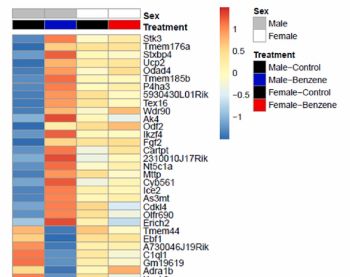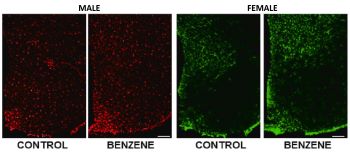Superfund Research Program
Benzene Exposure During Pregnancy Affects Later-Life Metabolic Health
View Research Brief as PDF(6.6MB)
Release Date: 08/02/2023
![]() subscribe/listen via iTunes, download(5.1MB), Transcript(214KB)
subscribe/listen via iTunes, download(5.1MB), Transcript(214KB)
Prenatal exposure to the air pollutant benzene may lead to a higher risk of metabolic diseases later in life, according to a study in mice partially funded by the NIEHS Superfund Research Program (SRP). Benzene affects neurodevelopment, predisposing offspring to harmful metabolic effects, according to a research team led by Marianna Sadagurski, Ph.D., of the Wayne State University SRP Center.
Benzene is one of the 20 most widely used chemicals in the U.S. People can be exposed to it from industrial emissions, gasoline fumes, tobacco smoke, and when using some consumer products such as glues, solvents, paints, and detergents. Researchers have linked benzene exposure to many adverse health effects, including metabolic disorders and type 2 diabetes. More recently, studies suggest that exposure to benzene before birth can harm the offspring’s metabolic health.
The underlying mechanisms by which benzene exposure impairs metabolic health was of interest. In particular, the scientists wanted to study effects on the hypothalamus, an area of the brain that regulates several metabolic processes, including the production of hormones that suppress or stimulate appetite.
Pinpointing Genetic Changes
They exposed female mice to benzene during pregnancy. After birth, some mice continued benzene exposure during lactation. When the pups were 21 days old, the researchers used transcriptomic analyses — a technique that identifies which genes are expressed or suppressed — to evaluate changes to the hypothalamus.

In males, prenatal benzene exposure increased the expression of genes related to metabolic disorders and inflammation, while genes associated with neurodevelopment and cell movement were suppressed. Exposed male offspring also had changes in neurons that stimulate or suppress appetite and lower levels of leptin — a hormone that signals satiety to help the body maintain a normal weight. Both male and female mice exposed to benzene prenatally exhibited microgliosis — a condition in which immune cells in the brain react to injury to the nervous system.
Additional benzene exposure during lactation did not promote further changes in males or females. According to the authors, this emphasizes the importance of the developmental stages on microglia sensitivity and activation.
Fighting Stressors in Adulthood
The research team followed a group of offspring into adulthood who were additionally fed a high-fat diet for five months. They observed that, compared to mice that were not exposed to benzene prenatally, both male and female benzene-exposed mice exhibited decreased glucose tolerance and increased inflammation in the hypothalamus.

These findings demonstrate that prenatal benzene exposure may lower offspring’s ability to metabolize a high-fat diet, say the scientists. In addition, the team believes that even though benzene-exposed female offspring exhibited no genetic changes at a young age, exposure still affected cells in the hypothalamus, priming them to increased hypothalamic inflammation when challenged with high-fat diet.
According to the authors, exposure to benzene during fetal development can induce enduring modifications in the hypothalamus of offspring, potentially increasing their susceptibility to metabolic disorders later in life. There is a pressing need for additional investigations to uncover the collective influence of prevalent air pollutants on metabolic health.
For More Information Contact:
To learn more about this research, please refer to the following sources:
- Koshko L, Scofield S, Debarba L, Stilgenbauer L, Fakhoury P, Jayarathne H, Perez-Mojica JE, Griggs E, Lempradl A, Sadagurski M. 2023. Prenatal benzene exposure in mice alters offspring hypothalamic development predisposing to metabolic disease in later life. Chemosphere 330:138738. doi:10.1016/j.chemosphere.2023.138738 PMID:37084897 PMCID:PMC10199724
To receive monthly mailings of the Research Briefs, send your email address to srpinfo@niehs.nih.gov.


